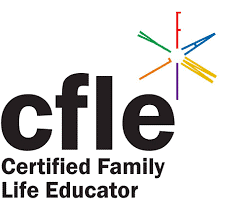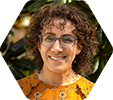Empower families with skills to enhance their well-being
Students interested in working with families may choose to pursue the Certified Family Life Educator (CFLE) credential.
Family Life Education is the practice of equipping and empowering family members to develop knowledge and skills that enhance their well-being and strengthen their interpersonal relationships, all through an educational, preventive, and strengths-based approach.
Family Life Educators have an understanding of these Family Life Education Content Areas:
- Families and Individuals in Societal Contexts
- Internal Dynamics of Families
- Human Growth and Development Across the Lifespan
- Human Sexuality
- Interpersonal Relationships
- Family Resource Management
- Parent Education and Guidance
- Family Law and Public Policy
- Professional Ethics and Practice
- Family Life Education Methodology
Benefits of CFLE Certification
The CFLE credential, which is offered by the National Council on Family Relations (NCFR), can:
- help employers and clients see you as more knowledgeable and qualified
- give you a competitive advantage to attract customers
- increase the breadth of job opportunities available to you
- provide a reason to increase your compensation
Where do CFLEs Work?
Family Life Educators work in a wide range of settings and programs serving individuals of all ages. These career opportunities are available in family resource services, community based social services, education, family intervention, early childhood education, government and public policy, healthcare and family wellness, international education and development, research, and writing and communication.
Becoming a CFLE
Anyone with at least a bachelor’s degree can pursue the CFLE credential by taking the CFLE exam. Interested students majoring in Human Development should speak with their mentor or Dr. Chapman, chapmaj@eckerd.edu, about this opportunity. Although not an exhaustive list, the following courses are a good starting point to gain knowledge in the ten content areas:
- HD 101S: Introduction to Human Development
- HD 203: Adolescent Experience
- HD 235S: Aspects of Aging
- HD 204: Socialization: Study of Gender
- HD 207S: Group Dynamics
- HD 209: Family Systems
- HD 328: Cultural Diversity: Theory and Practice
- HD 386: Ethical Issues in Human Development
- HD 401: Internship in Human Development (complete a Family Life-related internship)
Students should plan for extra study time in their final semester/after graduation to prepare to take the CFLE exam
Banner photo (top) by Agung Pandit Wiguna from Pexels







